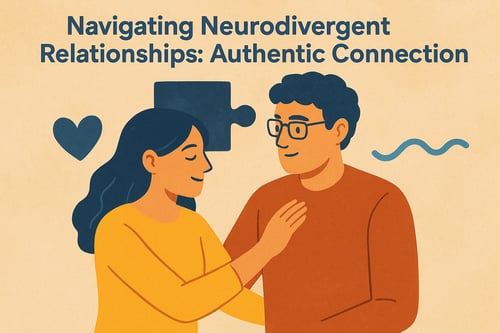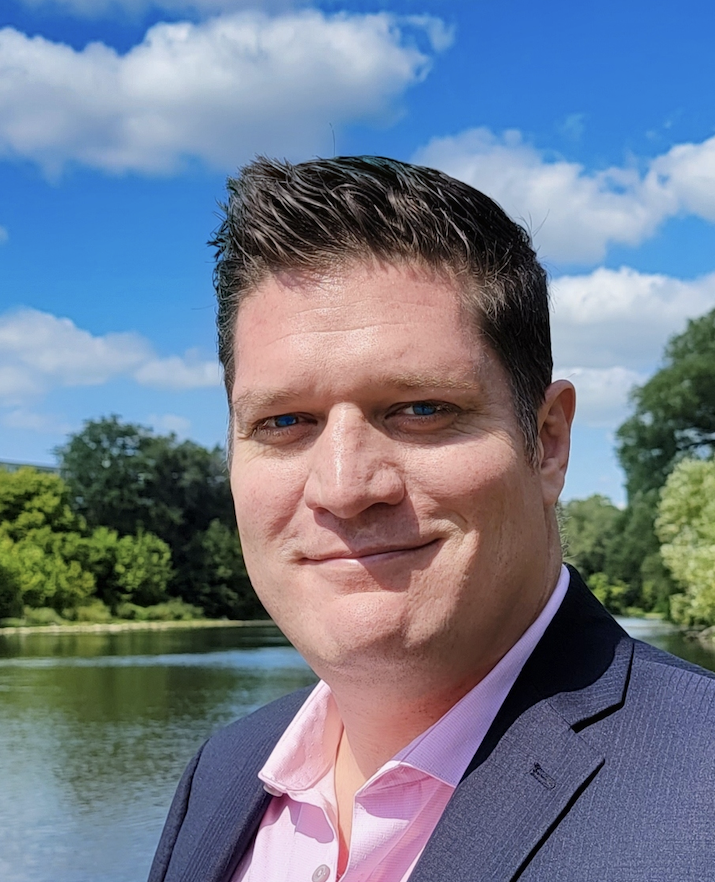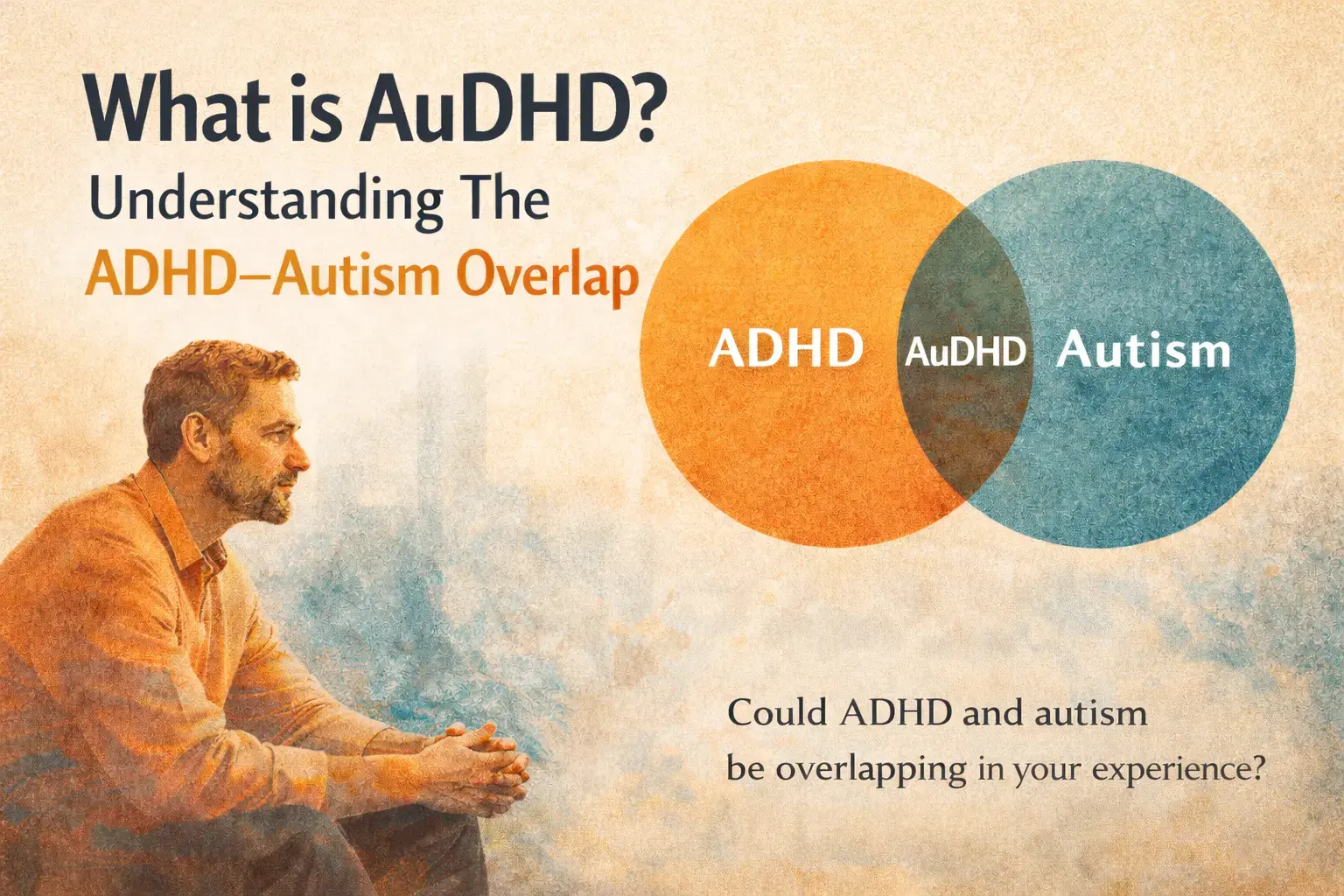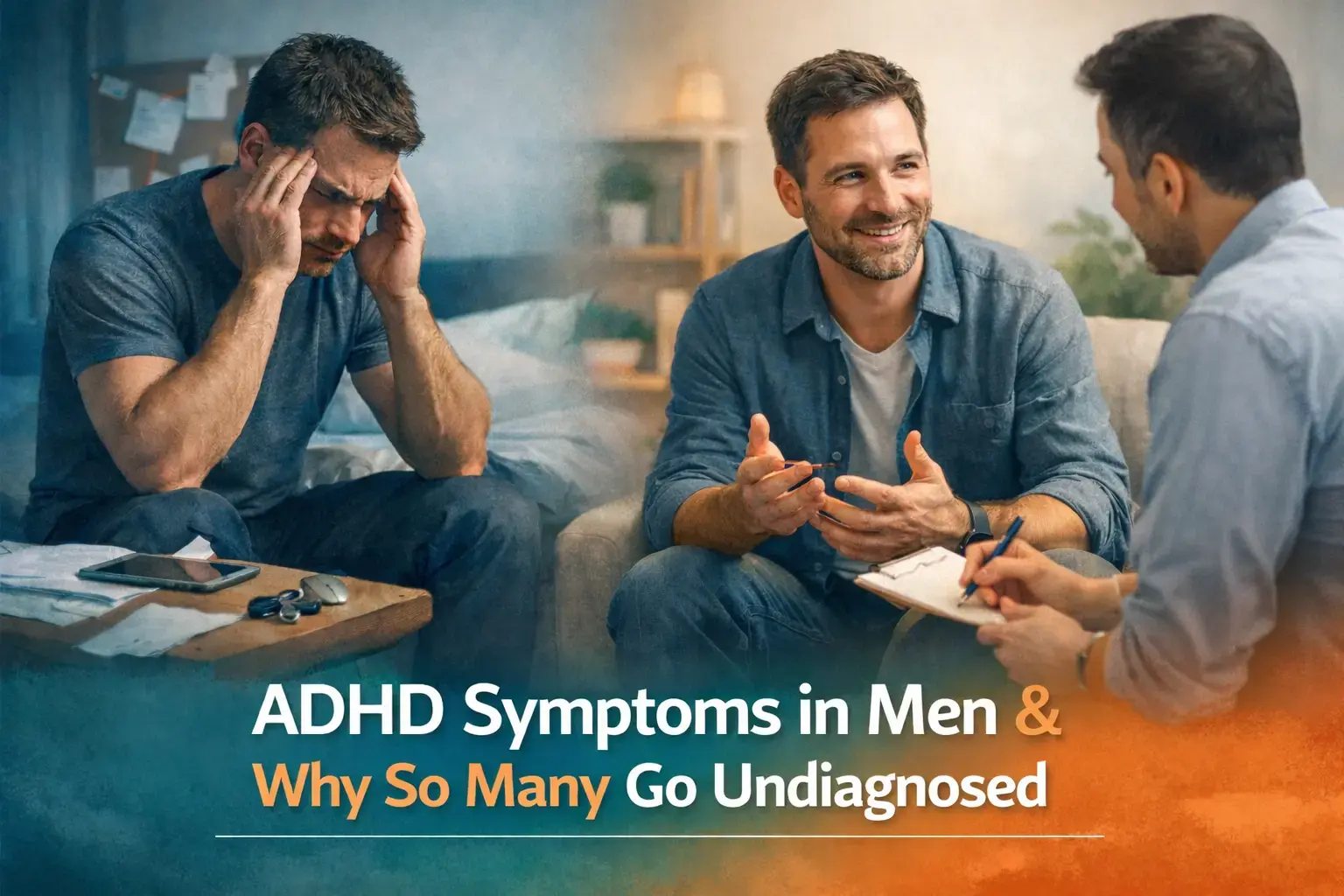Navigating Neurodivergent Relationships: Authentic Connection
“The meeting of two personalities is like the contact of two chemical substances: if there is any reaction, both are transformed.” – Carl Jung
Relationships are at the heart of human life. They are where we are seen, where we grow, and where we sometimes hurt. For neurodivergent people, relationships carry unique layers of challenge and possibility. We long for authentic connection, yet the road there may feel filled with invisible barriers, miscommunications, misunderstandings, and societal scripts that weren’t written with us in mind.
Why do neurodivergent men struggle to recognize their own needs?
This blog examines how neurodivergent adults can navigate relationships, whether romantic, platonic, or professional, through the lens of authenticity. We’ll explore communication strategies, the role of self-compassion, and how concepts from therapy and neuroscience can help us build meaningful, lasting connections.
For a deeper look at men’s emotional worlds, you may appreciate why neurodivergent men struggle to recognize needs.

The Universal Desire for Connection
Every human being longs to connect. We all want to be seen for who we are and to feel accepted. But for many neurodivergent people, the pursuit of connection has often meant masking, performing, or bending into shapes that feel unsustainable.
Someone with ADHD may have been told they talk “too much” or are “too distracted.” An autistic person may have heard that their honesty is “too blunt.” A gifted or twice-exceptional adult may have been told they are “too intense.” These messages echo into adulthood, creating shame that can keep us from showing up authentically in our relationships.
And yet, the very qualities criticized by others are often the same ones that make neurodivergent relationships deeply rewarding: passion, creativity, loyalty, insight, honesty, and depth. Authentic connection begins when we stop trying to erase these traits and instead embrace them as essential parts of who we are.
Communication in Neurodivergent Relationships
Communication is often described as the “foundation” of healthy relationships. For neurodivergent people, the process of communication can be both a strength and a stumbling block.
- Directness vs. Indirectness: Many autistic people value direct and literal communication, which can sometimes be misunderstood as rudeness by neurotypical partners. Naming this difference openly can help prevent misinterpretation.
- Energy and Impulsivity: Adults with ADHD may interrupt or bounce between topics quickly, which can be misread as not listening. Clarifying that this is part of how the ADHD brain processes can shift the meaning from “disrespectful” to “engaged.”
- Sensory Differences: Loud environments or overlapping conversations may make it harder to track communication. Acknowledging these needs and finding sensory-safe environments supports clarity and reduces conflict.
DBT Skills for Building Stronger Relationships
Dialectical Behaviour Therapy (DBT) offers practical skills that support communication and connection, especially when emotions run high. Three sets of tools are particularly helpful in relationships: DEAR MAN for asking clearly and respectfully for what you need, GIVE for nurturing and maintaining healthy connections with gentleness and validation, and FAST for protecting self-respect by being fair, truthful, and aligned with your values. Together, these skills remind us that authentic connection is not about always getting it “perfect,” but about balancing honesty, compassion, and self-respect in ways that help relationships thrive.
Authenticity as the Foundation of Connection
An authentic connection requires being able to show up as we truly are. For many neurodivergent adults, years of masking, hiding stims, toning down enthusiasm, or overcompensating to fit in can create deep exhaustion.
- CFT (Compassion-Focused Therapy): CFT helps soften the inner critic, allowing us to show up without the shame of feeling “too much” or “not enough.” Self-compassion is not self-indulgence; it is the practice of making room for the fullness of who we are.
- Mindfulness: Invites us to slow down and notice, rather than rehearsing the “perfect” thing to say, and instead stay present to what is happening in the moment. Authentic connection often emerges in the quiet pauses, not in polished performances.
Authenticity does not mean oversharing everything at once. It means finding the balance between safety and openness, trusting ourselves to reveal what feels aligned with who we are and our values, which can help guide our relationships.
What values do I want to guide how I show up in my relationships?
Potential Resource: What is the role of identity in healing?
Challenges in Cross-Neurotype Relationships
Relationships between neurodivergent and neurotypical partners—or between partners with different neurotypes—come with unique dynamics. Each partner may process the world, emotions, and communication in fundamentally different ways.
- Different Processing Speeds: A neurotypical partner may prefer immediate responses, while a neurodivergent partner might need more time to process. Without awareness, this can be misread as disinterest or avoidance.
- Contrasting Communication Styles: What feels like honesty and clarity to one partner may feel blunt or insensitive to the other. Conversely, what feels like subtlety or nuance to one may feel vague or confusing to the other.
- Mismatch in Social Energy: One partner may crave frequent socializing, while the other may need downtime to recover from sensory or social fatigue.
The gift of cross-neurotype relationships is that learning about each other’s neurotype can become a bridge to compassion. When we understand why our partner communicates, reacts, or recharges the way they do, empathy grows.
Practical steps include:
- Learn Each Other’s Language: Read about your partner’s neurotype or ask them to share resources. Curiosity is a form of love. It might be that you have a non-traditional love language; some would suggest info-dumping is a form of love language that comes out when we feel safe and comfortable with someone.
- Create Shared Meaning: Develop simple phrases that help clarify moments of confusion (e.g., “I need processing time,” or “This is sensory overload for me”). Often, these phrases help us to understand where each other are at each moment, which helps us to navigate various aspects of relationships. If a partner is overwhelmed, knowing this can help someone be more compassionate to their partner.
- Practice Double Empathy: Instead of assuming your perspective is the default, recognize both experiences as valid and important. Considering our partner's feelings and how they may be experiencing things can be a useful cognitive exercise to avoid being dismissive or invalidating towards our partner's feelings.
By valuing difference instead of trying to erase it, cross-neurotype couples can build stronger, more resilient bonds.
Practical Tips for Authentic Connection in Neurodivergent Relationships
While theory is helpful, connection is built in daily practices. Here are some practical strategies that support authentic connection in neurodivergent relationships:
- Name Your Needs Early: Instead of waiting until frustration builds, share your sensory or communication needs upfront.
- Use Written or Visual Tools: Shared calendars, sticky notes, or messaging apps can help reduce reliance on working memory and prevent misunderstandings.
- Create “Decompression Time”: Schedule quiet moments after work or in overstimulating environments before diving into conversation.
- Practice Attunement: Notice your partner’s non-verbal cues, like changes in tone, energy, or facial expressions, and ask clarifying questions gently.
- Celebrate Differences: Name and affirm the unique strengths neurodivergence brings: creativity, humour, loyalty, and insight.
- Repair Quickly: Misunderstandings are inevitable. A simple repair statement like, “I realize that came out sharply, what I meant was…” prevents distance from building.
My article on unmasking in everyday life pairs well with these relationship dynamics.
The Role of the Nervous System in Relationships
Connection doesn’t just happen in the mind—it happens in the body. Polyvagal theory explains how our nervous systems respond to safety and danger cues, often before words are spoken.
- A partner’s calm tone or gentle smile may signal safety, helping us soften into connection.
- A loud voice, rushed pace, or disapproving expression may trigger a stress response, making an authentic connection more difficult.
Learning to notice these nervous system cues, both in ourselves and in our partners, can help us regulate together. This may look like taking breaks, engaging in grounding exercises, or simply validating one another’s needs for space and calm.
Authentic connection thrives when our nervous systems feel safe enough to stay engaged.
How do I know when I feel authentically connected with someone? What does it feel like in my body?
Meeting Our Parts with Curiosity
In relationships, old patterns often resurface. Perhaps an anxious part fears abandonment, or a protective part withdraws at the first sign of conflict. Internal Family Systems (IFS) teaches us that these parts are not flaws—they are protective strategies developed over time.
In relationships, sharing in “parts language” can actually foster intimacy:
- “A part of me feels overwhelmed right now, but another part longs to stay connected.”
- “A protective part wants to shut down, but my deeper self wants us to talk this through.”
This way of communicating allows partners to see each other with compassion instead of judgment.
Which parts of me find relationships challenging, and what might they need to feel safe?
Practicing Self-Compassion in Connection
Self-compassion is the soil from which authentic relationships grow. Without it, we may continue to mask, withdraw, or criticize ourselves in ways that block intimacy.
Practical ways to cultivate self-compassion in relationships include:
- Journaling about strengths and values instead of only focusing on struggles.
- Replacing self-critical thoughts with validating statements: “It makes sense that this feels hard.”
- Seeking environments and people who affirm rather than diminish our neurodivergent traits.
When we treat ourselves with kindness, it becomes easier to extend that same kindness to others.
Where am I practicing self-compassion in connection, and where might I invite more of it?
Neurodivergent relationships are not about fixing differences. They are about embracing them, learning to communicate with compassion, and honouring the authentic self. When we stop striving to perform for acceptance and instead show up as we truly are, connection deepens.
Authentic connection doesn’t require perfection—it requires courage, patience, and compassion. In the end, what sustains us are not flawless performances, but relationships where we are free to be ourselves.
What small step could I take this week to show up more authentically in one relationship?
If you’d like to learn more about how I support clients seeking authentic connection, visit my About Michael page.
If you see aspects of your own relational patterns in this post, you’re welcome to reach out through my contact page to explore therapy focused on connection and clarity.
Or stay on the blog and learn more about ADHD, Autism, and Giftedness.
Frequently Asked Questions About Neurodivergent Relationships and Authentic Connection
What makes neurodivergent relationships unique?
Neurodivergent relationships often involve different communication styles, sensory needs, and emotional intensities. These differences may create challenges but also bring depth, honesty, and creativity when embraced authentically.
How can communication be improved in neurodivergent relationships?
Clear and direct communication is key. Tools like ACT values clarification, DBT skills (DEAR MAN, GIVE, FAST), and visual supports can help reduce misunderstandings. Allowing processing time and checking in about needs also strengthens communication.
Why is authenticity so important for neurodivergent connection?
Authenticity allows neurodivergent individuals to move beyond masking and shame. When people show up as their true selves, relationships become more sustainable, resilient, and deeply connected.
How does polyvagal theory help in understanding neurodivergent relationships?
Polyvagal theory explains how nervous system states shape connection. By recognizing cues of safety—such as tone, pacing, and attunement—partners can co-regulate and build stronger emotional intimacy.
Can therapy support authentic connection in neurodivergent relationships?
Yes. Becoming Yourself Neurodiversity therapy offers tools, validation, and a safe environment to explore communication, reduce shame, and practice authenticity. A neurodiversity-affirming therapist can tailor strategies to each person’s strengths and challenges.
Blog Disclaimer
This blog includes occasional personal anecdotes used to illustrate therapeutic ideas and foster connection. All identifying details have been altered or omitted to protect confidentiality. These reflections are intended as examples only; every individual’s experience is unique, and what resonates for one person may not apply to another.
The information provided here is for educational and informational purposes and should not be considered a substitute for professional medical or mental health advice, diagnosis, or treatment. If you have concerns about your health or well-being, please consult a qualified healthcare provider or licensed mental health professional.
Psychotherapy services described on this site are available to residents of Ontario. If you are interested in support or would like to schedule a complimentary 20-minute consultation, you are welcome to contact me through my practice.
These resources are offered to support your learning and self-understanding as you move toward a more grounded, authentic, and meaningful life.

Michael Holker HBA, BSW, MSW
Michael Holker, MSW, RSW, is the compassionate heart behind Becoming Yourself Counselling. Discovering his own neurodivergence later in life shaped his existential, humanistic, and strengths-based approach to therapy. Guided by his lived experience, Michael helps neurodivergent individuals move beyond self-criticism toward self-understanding, self-compassion, and self-acceptance. His work invites clients to honour their journeys, embrace their resilience, and reconnect with their authentic selves, cultivating a life of greater alignment and meaning.


